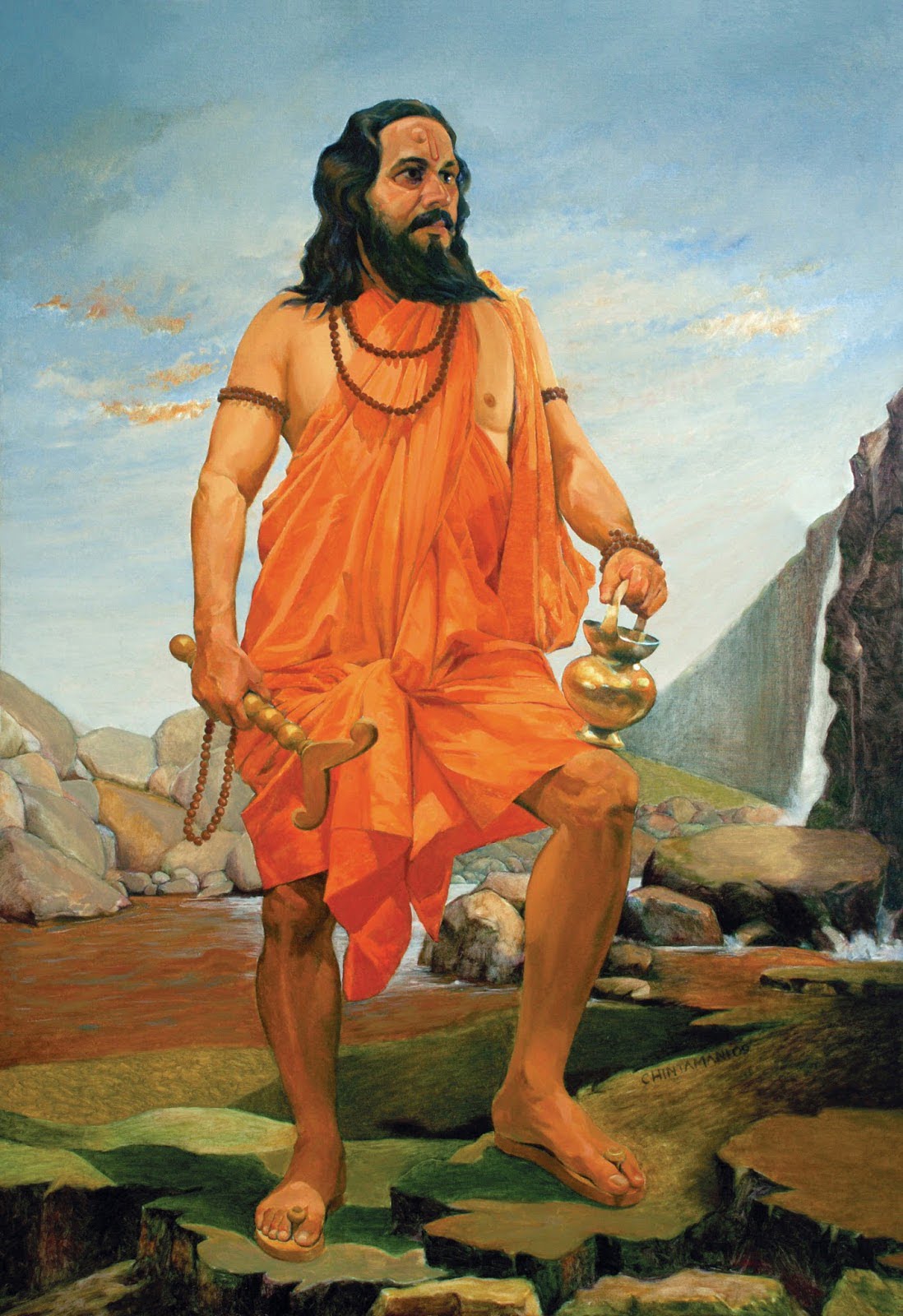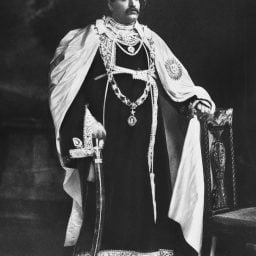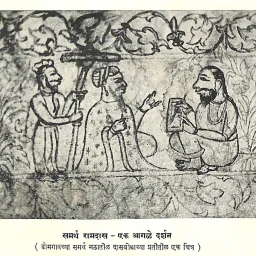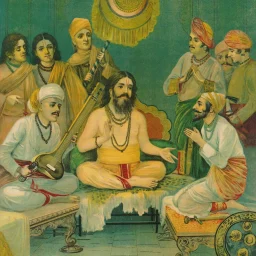Anandvan Bhuvani,” composed by Samarth Ramdas, is a remarkable 59-verse poem written in the ‘Anushtup’ meter (अनुष्टुप छंद misspelled as “Anushtubh” in most articles and books). To truly appreciate its intricate wordplay, emotional fervor, and profound meanings, one must read the original text. The poem’s melodic charm enhances its philosophical depth.
The oppressive rule of the Malech rulers—Aadilshahi, Qutubshahi, and Mughals—was a significant calamity for our nation and culture. Overcoming these obstacles required immense effort to allow our culture to breathe freely once more. Samarth Ramdas envisioned a world where these Malech threats were eradicated, leading to a purified earth.
Our agitated deities, driven by this lofty goal, would assist us in overcoming these obstacles. Only by dismantling these impediments could people truly enjoy the freedom of cultural independence. This vision lay at the core of Swami’s dreams. Witnessing these dreams materialize brought immense joy to Swami, a joy vividly expressed in this poem.
...A musical and lyrical feat that is impossible for contemporary artists. This powerful 17th century Marathi composition makes all Genz artists unskilled nobody. Audiences and artists should try to emmulate such standards in their taste.
The fervor in Ramdas’s poetry is challenging to capture in prose. Therefore, one must read the original verses to experience the passion, flowing language, profound thoughts, and expansive horizons of his dreams. Ramdas harbored a vision of Ram Rajya, a righteous kingdom. By building a virtuous organization and utilizing it to support Hindu Swarajya, Swami undertook revolutionary work. The realization of these dreams brought unparalleled joy to his heart, a joy that shines through in his words.

This poem points to various key historical events that were unfolding in western Bharat in the 17th century. Cruel regime of Malech rulers, rise of Chatrapati Shivaji Maharaj’s Swaraj, vanquishing of Malech rulers, and the support of divine power.
In the first nine verses of this poem, the sorrows of human life are contemplated. Up to the twenty-fourth verse, the state of the Shiv-Mughal era and the valor of the Marathas are described. In verse 31, the phrase “भीम चि धाडिला देवे” (Bhim Chi Dhadila Deve) shows a respectful reference to Chhatrapati Shri Shivaji Maharaj. The next fifteen verses describe the grandeur of the Shiv era, while the last nine verses extol the grace of Shri Ram and Ramvardayini Mata (aa presiding deity located at the foothills of Pratap Gad) as narrated by Sant Ramdas Swami.
Finally, it is composed with the mathematical precision of Anushtup Chands.
If you pay close attention to composition, it is a quatrain of four lines. Each line, called a Charan (चरण lit. “foot”), has exactly eight syllables called akshar (अक्षर lit. “eternal”).
Every fifth akshar is laghu (लघु, short syllable) in all charans.
Seventh akshar is laghu (लघु, short syllable) in second and fourth charans.
Sixth akshar is guru (long syllable) in all charan.
We recommend you watch an explanatory video about Anushtup Chand on internet
जन्मदु:खें जरा दुखें । नित्य दु:खे पुन्ह पुन्हा । संसार त्यागणें जाणें । आनंदवनभुवना ।।१।।
वेधले चीत्त जाणावें । रामवेधी निरंतरी । रागे हो वीतरागे हो । आनंदवनभुवना ।।२।।
संसार वोढितां दु:खे । ज्याचे त्यासीस ठाऊंकें । परंतु येकदा जाणे । आनंदवनभुवना ।।३।।
न सोसे दु:ख तें होतें । दु:ख शोक परोपरी । येकाकी येकदां जावे । आनंदवनभुवना ।।४।।
कष्टलो कष्टलो देंवा । पुरे संसार झाला । देहत्यागासी येणें हो । आनंदवनभुवना ।।५।।
जन्म ते सोसिले मोठे । आपाय बहुतांपरीं । उपाये धाडिलें देवें । आनंदवनभुवना ।।६।।
स्वप्नी जें देखिलें रात्री । तें तें तैसेंची होतसे । हिंडता फिरतां गेलों । आनंदवनभुवना ।।७।।
हे साक्ष देखिली दृष्टी । किती कल्लोळ उठीले । विघ्नघ्ना प्रार्थिले गेलों । आनंदवनभुवना ।।८।।
स्वधर्म आड जें विघ्ने । तें तें सर्वत्र उठीलें । लाटिली कुटिली देवें । दापिली कापिले बहु ।।९।।
विघ्नाच्या उठिल्या फौजा । भीम त्यावरी लोटला । घर्डिलीं र्चिडलीं रागे । रडविले बडविले बळे ।।१०।।
हाकिली टांकिली तेणें । आनंदवनभुवनीं । हांक बोंब बहु जाली । पुढें खतल्ल मांडिले ।।११।।
खौळले लोक देवाचे । मुख्य देवची उठीला । कळेना काय रे होतें । आनंदवनभुवनीं ।।१२।।
स्वर्गीची लोटली जेथे । रामगंगा माहां नदी । तीर्थासी तुळणा नाहिं । आनंदवनभुवनीं ।।१३।।
ग्रंथी जे वर्णिले मागे । गुप्तगंगा महां नदी । जळांत रोकडे प्राणी । आनंदवनभुवनीं ।।१४।।
सकळ देवांची साक्षी । गुप्त उदंड भूवने । सौख्य च पावणे जाणे । आनंदवनभुवनीं ।।१५।।
त्रैलोक्य चालिलें तेथें । देव गंधर्व मानवी । ऋषी मुनी माहां योगी । आनंदवनभुवनीं ।।१६।।
आक्रा आक्रा बहु आक्रा । काय आक्रा कळेचिना । गुप्त ते गुप्त जाणावे । आनंदवनभुवनीं ।।१७।।
त्रैलोक्य चालिला फौजा । सौख्य बंदविमोचनें । मोहिम मांडली मोठी । आनंदवनभुवनीं ।।१८।।
सुरेश उठिला आंगे । सुरसेना परोपरीं । वेष्टीत कर्कशे यानें । शस्त्रपाणी महां बळी ।।१९।।
देव देव बहु देव । नाना देव परोपरीं । दाटणी जाहाली मोठी । आनंदवनभुवनीं ।।२०।।
दिग्पती चालिले सर्वें । नाना सेंना परोपरीं । वेष्टीत चालिले सकळै । आनंदवनभुवनीं ।।२१।।
मंगळे वाजती वाद्यें । माहांगणासमागमे । आरंभी चालीला पुढें । आनंदवनभुवनीं ।।२२।।
राशभें राखिलीं मागें । तेणें रागेंची चालिला । सर्वत्र पाठीसी फौजा । आनंदवनभुवनीं ।।२३।।
आनेक वाजती वाद्ये । ध्वनी कल्लोल उठीला । छेबींने डोलती ढाला । आनंदवनभुवनीं ।।२४।।
विजई दीस जो आहे । ते दीसीं सर्व उठती । आनर्थ मांडला मोठा । आनंदवनभुवनीं ।।२५।।
देवची तुष्टला होता । त्याचे भक्तीस भुलला । मागुता क्षोभला । आनंदवनभुवनीं ।।२६।।
कल्पांत मांडला मोठा । म्लेंछदैत्य बुडावया । कैपक्ष घेतला देवीं । आनंदवनभुवनीं ।।२७।।
बुडाले सर्व ही पापी । हिंदुस्थान बळावलें । अभक्तांचा क्षयो जाला । आनंदवनभुवनीं ।।२८।।
पूर्वी जे मारिले होतें । ते ची आतां बळावलें । कोपला देव देवांचा । आनंदवनभुवनीं ।।२९।।
त्रैलोक्य गांजिले मागें । ठाउकें विवेकी जना । कैपक्ष घेतला रामें । आनंदवनभुवनीं ।।३०।।
भीम ची धाडिला देवें । वैभवें धांव घेतलीं । लांगूळ चालिले पुढे । आनंदवनभुवनीं ।।३१।।
येथूनी वाढिला धर्म । रमाधर्म समागमें । संतोष मांडला मोठा । आनंदवनभुवनीं ।।३२।।
बुडाला औरंग्या पापी । म्लेंछसंव्हार जाहाला । मोडलीं मांडली छेत्रें । आनंदवनभुवनीं ।।३३।।
बुडाले भेदवाही ते । नष्ट चांडाळ पातकी । ताडिले पाडिले देव । आनंदवनभुवनीं ।।३४।।
गळाले पळाले मेले । जाले देशधडी पुढे । निर्मळ जाहाली पृथ्वी । आनंदवनभुवनीं ।।३५।।
उदंड जाहालें पाणी । स्नान संध्या करावया । जप तप अनुष्ठानें । आनंदवनभुवनीं ।।३६।।
नाना तपे पुन्हश्र्चणैं । नाना धर्म परोपरीं । गाजली भक्ती हे मोठी । आनंदवनभुवनीं ।।३७।।
लीहीला प्रत्ययो आला । मोठा आनंद जाहाला । चढता वाढता प्रेमा । आनंदवनभुवनीं ।।३८।।
बंड पाषांड उडालें । शुध आधात्म वाढलें । राम कर्ता राम भोक्ता । आनंदवनभुवनीं ।।३९।।
देवालयें दीपमाळा । रंगमाळा बहुविधा । पुजिला देव देवांचा । आनंदवनभुवनीं ।।४०।।
रामवरदायनी माता । गर्द घेउनी उठीली । मर्दिले पूर्वीचे पापी । आनंदवनभुवनीं ।।४१।।
प्रतेक्ष चालिला राया । मूळमाया समागमें । नष्ट चांडाळ ते खाया आनंदवनभुवनीं ।।४२।।
भक्तांसी रक्षिलें मागें । आतां ही रक्षिते पाहा । भक्तांसी दीधले सर्वै । आनंदवनभुवनीं ।।४३।।
आरोग्य जाहाली काया । वैभवें सांडिली सीमा । सार सर्वस्व देवाचें । आनंदवनभुवनीं ।।४४।।
देव सर्वस्व भक्तांचा । देव भक्त दुजें नसे । संदेह तुटला मोठा । आनंदवनभुवनीं ।।४५।।
देव भक्त येक जाले । मिळाले जीव सर्व हि । संतोष पावले तेथें । आनंदवनभुवनीं ।।४६।।
सामर्थे येश कीर्तींची । प्रतापें सांडिली सीमा । ब्रीदेंची दीधली सर्वे । आनंदवनभुवनीं ।।४७।।
राम कर्ता राम भोक्ता । रामराज्य भुमंडळीं । सर्वस्व मीच देवाचा । आनंदवनभुवनीं ।।४८।।
हेंची शोधुनी पाहावें । राहावें निश्चळी सदा । सार्थक श्रवणें होतें । आनंदवनभुवनीं ।।४९।।
वेद शास्त्र धर्मचर्चा । पुराणें माहात्में किती । कवित्वें नूतनें जीणें । आनंदवनभुवनीं ।।५०।।
गीत संगीत सामर्थ्ये । वाद्य कल्लोळ उठीला । मिळाले सर्व आर्थाथीं । आनंदवनभुवनीं ।।५१।।
वेद तो मंद जाणवा । सीद्ध आनंदवनभुवनीं । आतुळ महिमा तेथें । आनंदवनभुवनीं ।।५२।।
मनासी प्रचीत आली । शब्दीं विश्वास वाटला । कामना पुरती सर्वे । आनंदवनभुवनीं ।।५३।।
येथुनी वांचती सर्वे । ते ते सर्वत्र देखती । सामर्थ्य काये बोलावें । आनंदवनभुवनीं ।।५४।।
उदंड ठेविलें नामें । आपस्तुतीच मांडिली । ऐसे हें बोलणें नाहिं । आनंदवनभुवनीं ।।५५।।
बोलणें वाउगें होतें । चालिणे पाहिजें बरें । पुढे घडेल तें खरें । आनंदवनभुवनीं ।।५६।।
स्मरलें लिहीलें आहे । बोलता चालता हरी । काये होईल पाहावें । आनंदवनभुवनीं ।।५७।।
महिमा तों वर्णवेना । विशेष बहुतांपरी । विद्यापीठ तें आहे । आनंदवनभुवनीं ।।५८।।
सर्वसिद्या कळा विद्या । न भूतो न भविष्यति । वैराग्य जाहालें सर्वे । आनंदवनभुवनीं ।।५९।।






